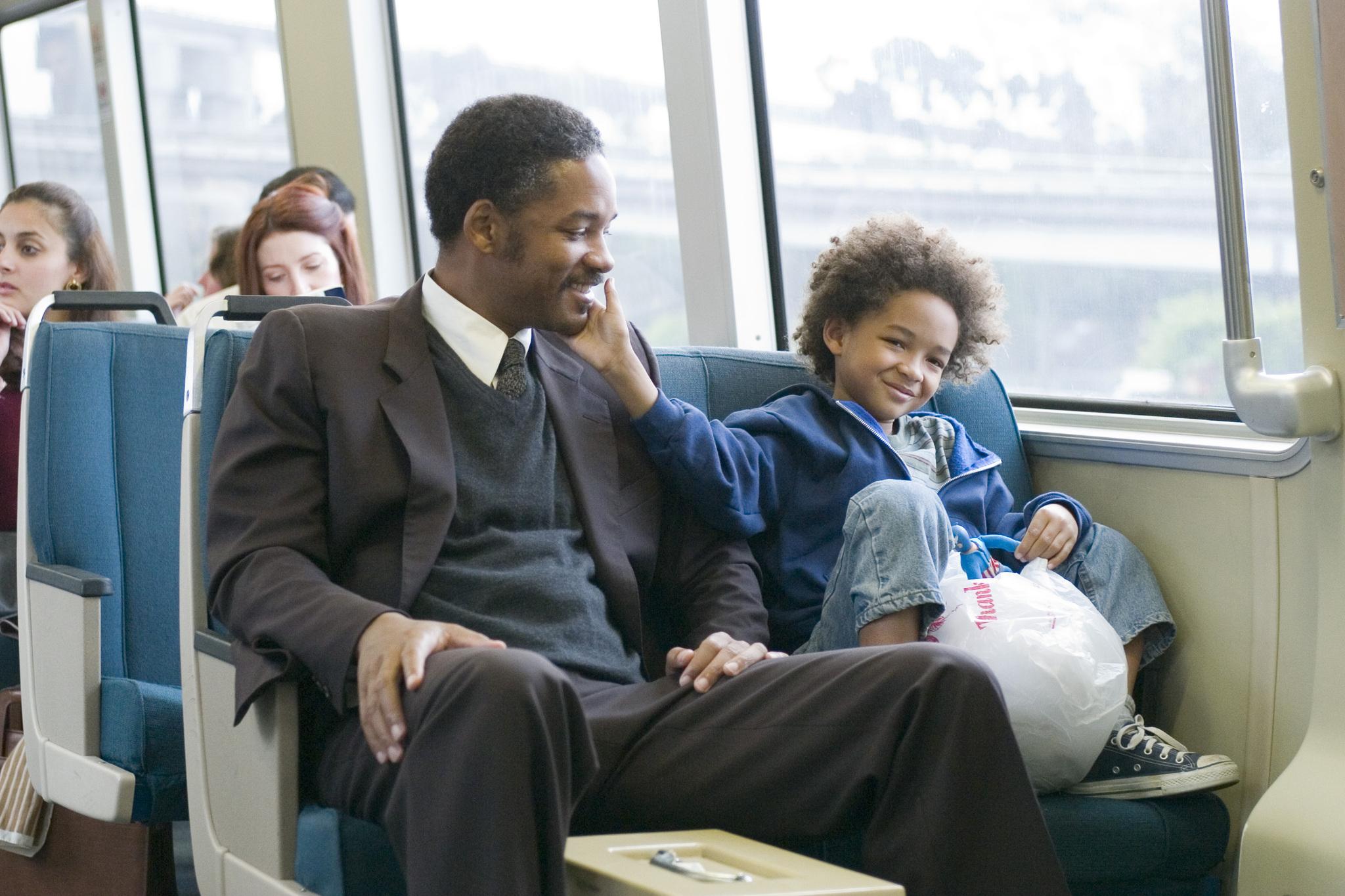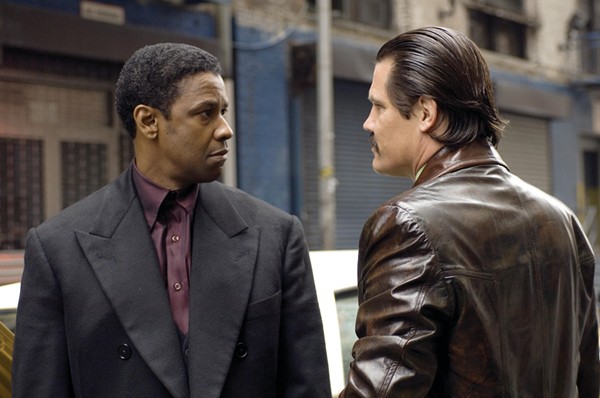6. A Beautiful Mind (2001)

The Movie Story: John Nash (Russell Crowe) is a genius mathematician, a professor at Princeton, and his girlfriend is Jennifer Connelly. Dream life indeed. That is, until his schizophrenia develops and he starts having deceiving hallucinations, from college friends who are secretly Communist spies to creepy little girls.
Nash revolutionized economics with his “game theory” but was mentally unstable and was committed to a mental hospital several times. He stopped taking his medication, believing they blocked his mind, under the patient watch of Jennifer Connolly’s character. In the meantime, Nash was awarded the Nobel Prize, followed by a Princeton ceremony in which fellow professors gift their elegant pens to him, in recognition for his efforts. Nash gives an emotional speech at the Nobel’s that puts a nice bow around the movie’s plot.
The Real Story: A Beautiful Mind isn’t as much the truthful portrayal of Nash’s experiences as it aspires to be. It resembles more a series of highlights and important moments of his life, put together by an uninterested high schooler.
In reality, John Nash’s disease was more serious and chaotic. After graduating from Princeton, he started claiming that aliens were sending him encrypted messages through the New York Times and thought that every man wearing a red necktie was a member of a Communist secret organization. Nash told his fellow professors that he was the Pope and the emperor of Antarctica and, when coming up with his famous theory, he thought he was a messenger of God himself.
He heard voices that mocked him and argued with him, implying the possibility that, thanks to his disease, he was able to come up with such an ingenious Nobel-worthy theory.
Nash also became a mythical figure on the Princeton campus. Students called him “The Phantom.” He wandered around the university, murmuring to himself, and regularly left secret codes and formulas on blackboards and pieces of paper he shoved under the doors of random classrooms.
Sadly, he never gave a speech at the Nobel ceremony, nor did the pen awarding thing happen, but it sure looks cool.
The movie also forgets to depict his gay experiences and constant marriage drama. But hey- Oscars don’t win themselves.
7. The Imitation Game (2014)

The Movie Story: The twentieth century’s Nikola Tesla, aka Alan Turing, is called upon by his country to help crack an undecipherable Nazi code. He will use all his genius to accomplish this task.
Turing invents a powerful machine and becomes the leader of his research team in no time, but also manages to get the dislike of his teammates in the meantime, due to his insufferable, arrogant behavior. He’s a reclusive mad scientist who’s also gay and tries to conceal his sexual orientation at all costs.
Alan befriends Joan Clarke, a scientist who is discriminated against for being a woman. Turing helps her get onto the decoding team and forms a strong friendship with her.
Things go south when the guy who hired him starts pressuring the group to show results and generally dislikes Turing under the suspicion of him being gay.
They finally crack the code, but are then forced to carry the moral responsibilities that come with using their knowledge wisely to win the war.
The Real Story: Graham Moore, the film’s writer, said that fact-checking a movie is like fact-checking Monet’s “Water Lilies.” Trying to justify altering history for dramatic purposes isn’t the same as painting some flowers, Graham. It’s less so when your film claims to be based on a true story.
Although Turing did have a childhood crush that tragically died, his love was in no way reciprocated and he didn’t name his machine “Christopher” but “Bamba.” It wasn’t so much as “his machine” either- he altered a Polish model with the help of his team, and they all made it work. The movie portrays a clueless research group collectively admiring Turing’s genius and not making any effort by themselves.
The Imitation Game chooses to portray Turing as a reclusive Sheldon Cooper-kind of character because that rolls with young people, I guess, to be full of insecurities and anxiety due to keeping his homosexuality a secret. In reality, Turing was a badass athlete. His coworkers described him as “easy to work with and friendly.” He was also openly gay and, thanks to his findings, the star of Bletchley Park (the facility in which they worked).
Alan was never in trouble with his boss for not getting results from his work. In fact, the guy in charge was less of a Dolores Umbridge and more of an Albus Dumbledore. He showed real interest in the project and was even helpful.
The plot point in which the team argues about hiding information that could save one of the members’ brother from certain death was completely fake and nonsensical. They were never in charge of such decisions and the guy with the brother in the navy simply didn’t have one.
The Imitation Game is a great film. But why claim that it’s based on a true story when clearly almost everything is made up or exaggerated?
8. American Sniper (2014)

The Movie Story: Bradley Cooper plays a modern Captain America, Chris Kyle, who has been a hunting expert since he was a kid and is a faithful, church-going, everyday-praying Christian. His only desire is to protect everyone dear to him from evil and his country overall, so he joins the US army after watching a terrorist bombing on the news.
He becomes an expert sniper, after enduring a harsh training process, and is then deployed to Iraq where he spends his days killing “savages” with his expert sniper skills.
Chris comes back home several times but is frustrated because he wants to keep killing insurgents to protect his fellow soldiers.
The protagonist struggles with PTSD for a while when he almost kills his own dog because he thought it was attacking a child at a party. Kyle then is killed by a fellow soldier for unknown reasons.
The Real Story: American Sniper represents the great danger these false “based on a true story” films can be. By portraying every Muslim as a villain and every American as a hero, Clint Eastwood painted a simplistic portrait of the Iraq war that is not only racist, but irresponsible.
Big examples of this include the exaggeration of facts to make Muslims more evil (the famous “child killing” scene never happened. Kyle killed a woman who was carrying a hand grenade in real life, but she didn’t send a kid to do the work for her) and overestimating Kyle’s heroism (who, in the film, only felt guilty for not killing more savages).
The movie exaggerates a barely relevant fact from Chris’ book. Villain sniper Mustafa is kind of based on a real guy Kyle heard of when he was in service, but he never even met or saw him. In the film he’s the main antagonist, the principal nemesis of the protagonist, and is killed in a climatic way three quarters into the movie. Then again, he’s not given any character development but serves as yet another pure evil that needed to be eliminated.
You see, in war there are no heroes- just winners and losers. Eastwood is not interested in portraying that reality, though. Instead, he chooses to give a handful of lines to all Muslim characters, showing each one of them is just evil with no motivation (like a murdered family member or something) to kill. They’re just Iraqi murdering machines whose only objective is to inconvenience the protagonist’s life.
American Sniper is a blatant propaganda film in which any non-American ever makes a mistake or does something bad. How are you not going to support the Iraq war when every Iraqi is a crazy, horrible savage?
9. The Pursuit of Happyness (2006)

The Movie Story: Chris Gardner, a devoted father who tries to provide a better future for him and his son by surviving the streets of San Francisco in order to find a job, will struggle in every way imaginable to make a living after his wife abandons him.
Chris suffers a lot of misfortunes: he’s evicted a couple of times, has to sleep in a subway bathroom along with his son and is arrested for not paying parking tickets. However, he never ceases to be a great and honest father. Finally he catches a break and gets a well-paying job after enduring a long, non-paying training phase.
The Real Story: After the real Chris got in the Dean Witter training program, he didn’t knew where his son was for the first four months. The boy, who was conceived when his father was married to another woman, was living with his mother at the time. Also, Gardner wasn’t arrested for lack of parking ticket payments- he was arrested after he was accused of domestic abuse by his wife.
The movie skips the time when Chris sells drugs, does cocaine and tries a bunch of other substances with his mistress.
He wasn’t such a perfect dad after all. Although, how can one blame him for not being a full-on saint in that awful situation? But maybe, if they had portrayed him as he really was, Will Smith would have won the Oscar.
10. American Gangster (2007)

The Movie Story: Denzel Washington plays the badass drug dealer Frank Lucas. We see him trying to claim some territory from his mob mentor that died in his arms (Denzel worked as his mentor’s driver for 15 years) by smuggling cheaper heroin from Vietnam. He does this by not giving a fuck and hiding the drugs in dead soldiers’ coffins from the war in said country.
Russell Crowe plays detective Richie Roberts, Frank’s nemesis. He pursues the main character throughout the whole film with wit and intelligence, leading a group of corrupt and honest cops alike.
Lucas ends up behind bars and rats out a few minor drug dealers, corrupt cops and DEA agents, getting his sentence reduced from 70 years to 5.
The Real Story: This one is not quite the filmmakers’ fault. Turns out that Frank Lucas is a compulsive liar who did everything he could to look cool on-screen.
He never smuggled drugs in coffins, but in furniture (not so rebellious now, huh?). Also, Lucas loves to claim that he never ratted out any fellow drug dealers. This is obviously a lie, confirmed by the very investigators. They say he ratted on every drug dealer he knew, big kingpins included: you don’t get your sentence reduced 65 years by only giving corrupt cops’ names.
Some DEA agents pointed out that all their hard work was dismissed from the film’s plot (they even filed a class action lawsuit against the movie studio, but it was soon dismissed), due to the filmmakers portraying Richie Roberts as the leader of the whole ordeal against Lucas. These agents claim that he had nothing to do with the overall capture, that he was only interested in the case when they started making arrests and, unfairly, ended up taking all the credit.
Everyone involved in the real life events agree that most of the movie’s plot points were fabricated. Lucas didn’t worked as a driver for his mentor for 15 years- he lied about that because he wanted to imply blatant familiarity with the deceased (the mobster didn’t die in his arms either). Also, his expensive fur coat wasn’t what gave him away- it was his super first-class seats at a stellar boxing match. Investigators were surprised when he had better seats than the Italian mafia.
American Gangster is an intense and well-made crime movie. But the fact that most of its plot was fabricated by the mind of the person the protagonist is based on is a hilarious fact.
There are dozens of movies missing from this list, but making an article with 100 entries isn’t really a neat job. The Butler, Good Morning Vietnam, My Left Foot, Ray, and several others could have made the list for their outrageous artistic “licenses,” but no one could ever beat Frank Lucas, lying his way into a sweet, made-up antihero tale about his own life.
Author Bio: Juan studies philosophy. He love films and music and plans to go to film school with his cat.